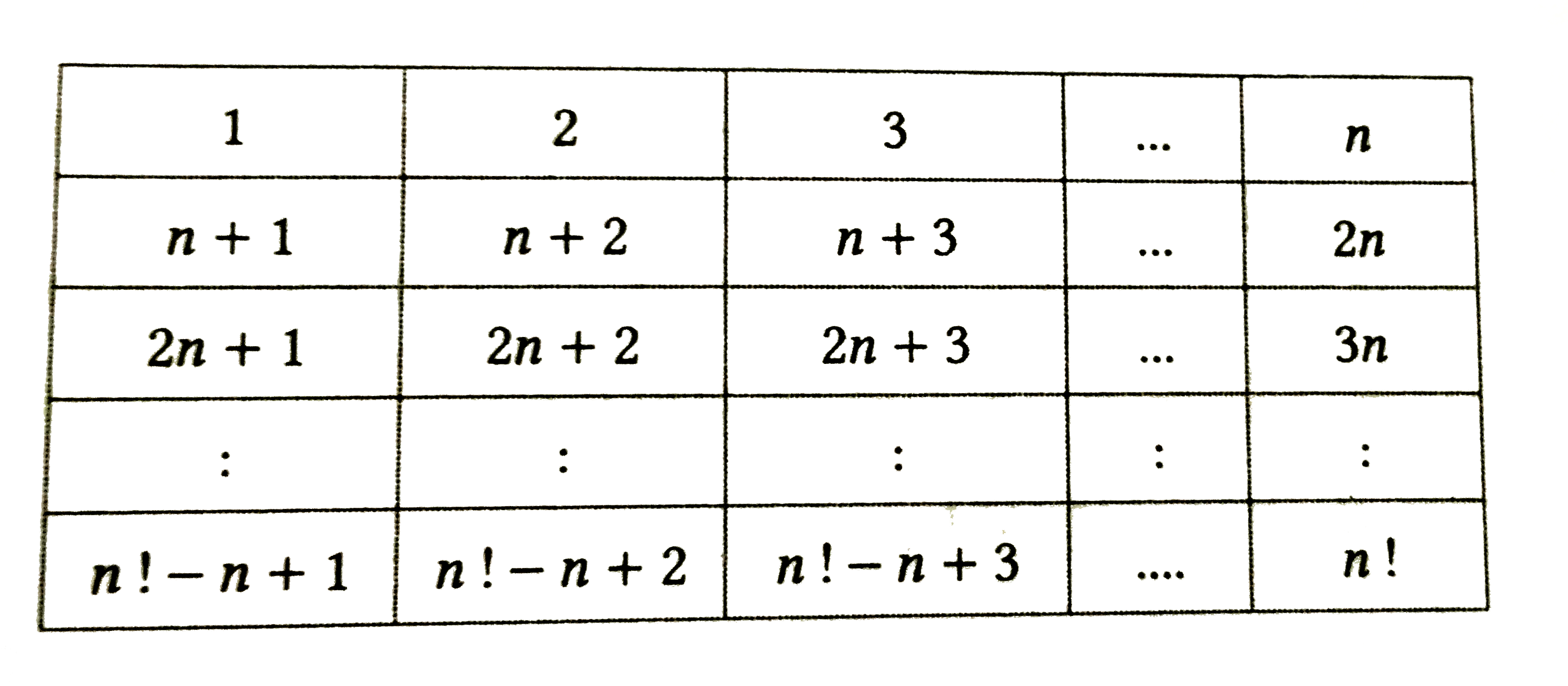Find n, if (n+2)!=60×(n−1)!Solution in Punjabi
First we show that the product of p consecutive positive integers is divisible by p!. Let the p consecutive integers be m,m+1,m+2, . . ,m+p-1. then,
m(m+1)(m+2)..(m+p−1)=(m+p−1)!(m−1)
=p!(m+p−1)!(m−1)!p!
=p!.m+p−1Cp
Since, .m+p−1Cp is an integer
∴.m+p−1Cp=m(m+1)(m+2)...(m+p−1)p!
Now, (n!)! is the product of the positive integers from 1 to n!. we write the integers from 1 to n! is (n-1)! rows as follows:
 ltBrgt Each of these (n-1)! rows contains n consecutive positive integers. the products of the conescutive integers in each row is divisible by n!. thus, the product of all the integers from 1 to n! is divisible by (n1)(n−1)!.
ltBrgt Each of these (n-1)! rows contains n consecutive positive integers. the products of the conescutive integers in each row is divisible by n!. thus, the product of all the integers from 1 to n! is divisible by (n1)(n−1)!.
Topper's Solved these Questions
- PERMUTATIONS AND COMBINATIONS BOOK - ARIHANT MATHSCHAPTER - PERMUTATIONS AND COMBINATIONS EXERCISE - JEE Type Solved Examples: Single Matching Type Questions
1 Videos
- PERMUTATIONS AND COMBINATIONS BOOK - ARIHANT MATHSCHAPTER - PERMUTATIONS AND COMBINATIONS EXERCISE - Exercise For Session 1
11 Videos
- PARABOLABOOK - ARIHANT MATHSCHAPTER - PARABOLAEXERCISE - Exercise (Questions Asked In Previous 13 Years Exam)
35 Videos
- PROBABILITYBOOK - ARIHANT MATHSCHAPTER - PROBABILITYEXERCISE - Exercise (Questions Asked In Previous 13 Years Exam)
55 Videos
Similar Questions
Solve the quadratic equation 2x^2 + 3x − 6 = 0 using the formula
View SolutionThere are three routes: air, rail and road for going from Chennai to Hyderabad. But from Hyderabad to Vikarabad, there are two routes, rail and road. The number of routes from Chennai to Vikarabad via Hyderabad is:
View SolutionLet A and B be two finite sets such that n(A) =85, n(B) = 65and n(A ∪ B) = 135, find n(A ∩ B)?
View Solutionfind the derivative of sin x cos x
View SolutionFind the sum of the series: 1.n+2.(n−1)+3.(n−2)++(n−1).2+n.1.
View Solutionश्रेणी 1⋅n+2⋅(n−1)+3⋅(n−2)+….+(n−1)⋅2+n⋅1 का योगफल ज्ञात कीजिए।
View SolutionFind n, if (n+2)!=60×(n−1)!
View SolutionEvaluate limn→∞[(1+1n)(1+2n)⋅⋅⋅(1+nn)]1n
View Solution(i) If (n+1)≠12[(n−1)!], find n
(ii) If (n+2)≠60[(n−1)!], find n
(iii) If (n+2)≠(2550)(n!), find n.
View SolutionEvaluate : (lim)x→∞ 11+n2+22+n2+...+nn+n2
View SolutionEvaluate limn→∞11+n2+22+n2+...+nn+n2.
View SolutionEvaluate limn→∞n−n2[(n+20)(n+2−1)(n+2−2)...(n+2−n+1)]n.
View SolutionFind the sum of the series: 1.n+2.(n−1)+3.(n−2)++(n−1).2+n.1.
View Solutionसीमा limn→∞n−n2((n+1)(n+12)(n+122)......(n+12n−1))n का मान ज्ञात कीजिए , यदि विद्यमान हो |
View SolutionFind n, if (n+2)!=60×(n−1)!
View SolutionFind the sum of the series: 1.n+2.(n−1)+3.(n−2)++(n−1).2+n.1.
View Solution
